July Kindness Calendar
July 16th is Camp Kindness Day, so we are getting you ready with our July Kindness Calendar! We encourage you to show kindness to someone every day and we came up with a few ways to help you do that! Click here to download the printable version.
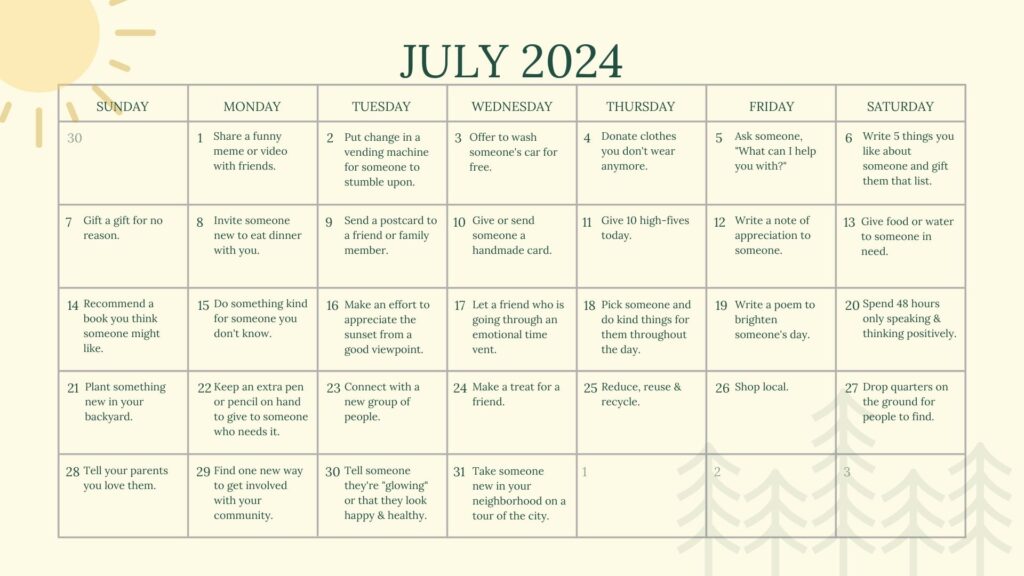
Session 1 Plus – Shaver Week Has Begun!
Yesterday, we welcomed an awesome group of campers for Session 1+, which starts with a week at our Shaver Island Outpost camp. Among this group of campers, there are ten 6-year campers, two 5-year campers, and one 10-year camper. Four campers are from outside of California.
They’re going to enjoy an action-packed week of waterskiing, wakeboarding, and kneeboarding on our island outpost in the middle of Shaver Lake. They will get to sleep under the stars after spending fun-filled days on the lake! How lucky they are!
Want to learn more about June Specialty? Click here.
June Kindness Calendar
Happy June and the start of GAC 2024! Here are some great ideas of how we can be kind to others this month. Enjoy! You can download a printable version here!
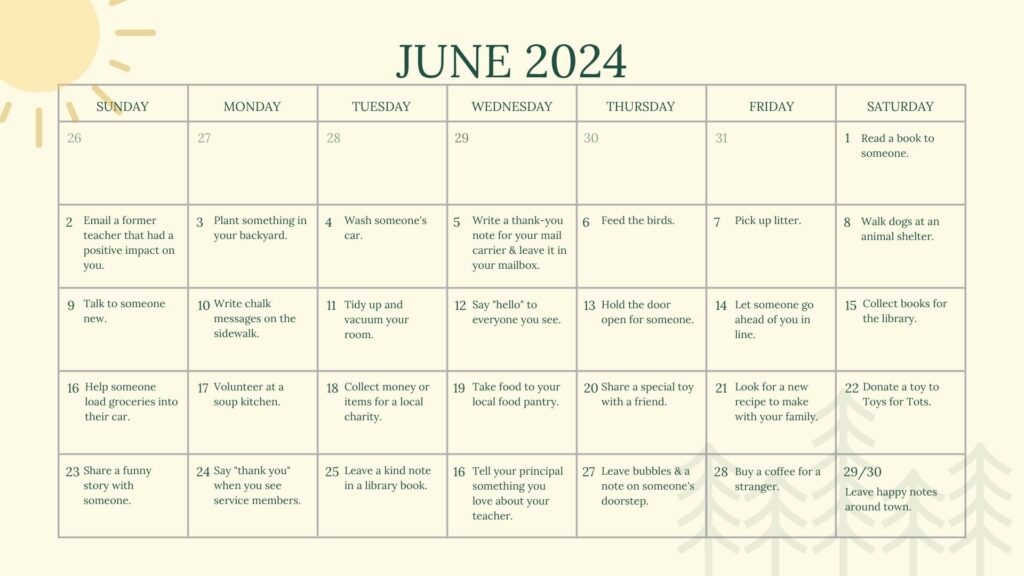
May Kindness Calendar
Hello everyone! It’s a new month so that means new opportunities to show kindness to those around us! Click here to download the printable version.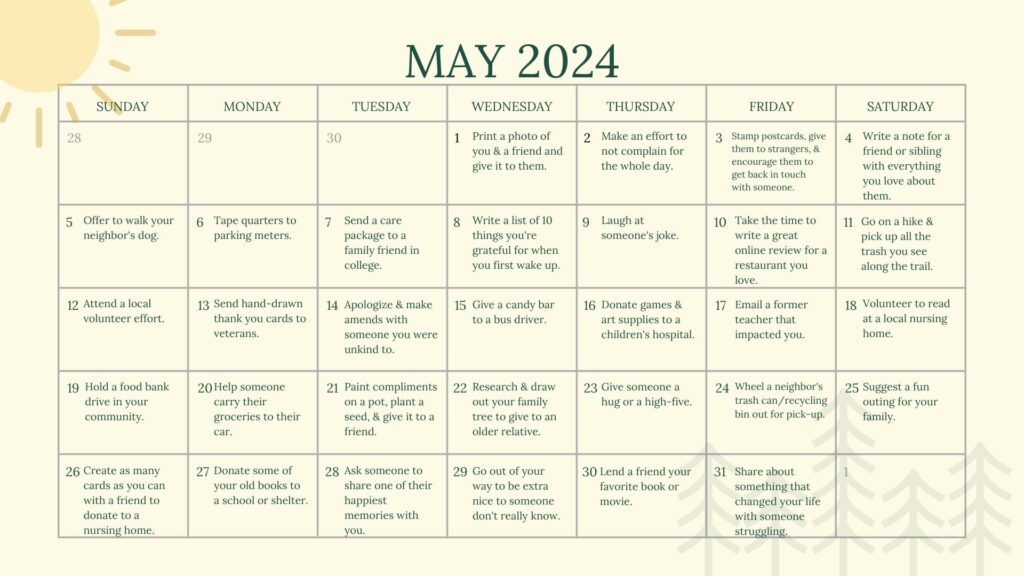
Our Favorite Read Aloud Books
At Gold Arrow Camp, the tradition of reading to campers every night holds a special place in the daily routine. After roasting marshmallows around the campfire and getting ready for bed, counselors read a book aloud to their campers. Even our oldest campers enjoy this nightly practice!
Reading builds empathy, and is a powerful tool for helping campers develop kindness and compassion towards one another. Reading ignites camaraderie and conversation as campers think and talk about the situations and challenges the characters face. Many campers share with us that listening to a story in their sleeping bags is one of their favorite parts of the day.
Five Tips for Choosing a Great Read Aloud Book at Home
- Start a series! Many counselors choose to read the first book in a series to their campers. While some of the books are larger (and cabin groups are not always able to finish the book), many campers report that they’re going to read the rest of the book when they get home, or read the next book in the series. A series offers continuity and an opportunity for campers to invest in the characters, setting, and plot. If you are trying to encourage more reading at home, one strategy is to start reading a series together. A child might choose to finish reading the series on their own. When I was little, my mom read the first three Harry Potter Books to me aloud. After reading three books together, I read the final four installments independently as they were released. Starting the series together helped me invest in the characters and made me excited for the new releases!
- Use online resources to find books that align with your child’s interests. Goodreads and Common Sense Media both offer reviews and ratings for children’s books. Goodreads also provides a fun way to start a “Reading Challenge” and set a reading goal for the year. At Gold Arrow Camp, we use Common Sense Media to guide counselors towards the perfect age-appropriate books.
- Visit your local library or bookstore, and involve your child in the selection process to foster ownership!
- Choose a book that has been made into a movie, and plan a family movie night when you finish reading the book. This is a great way to engage in discussions about a story, and talk about changes made from the book to the movie version.
- If your child is older and wants to read independently, find a time to read together as a family, or start a family book club and read the same book at the same time. In Michele Borba’s book Unselfie, Borba recommends looking at your child’s required reading list for school and picking up an additional copy for yourself!
Our Counselors’ Favorite Read Aloud Books
Bears (Grades K-2)
- Wonder by R.J. Palacio
- Beezus & Ramona by Beverly Cleary
- Danny the Champion of the World by Roald Dahl
- Charlie and the Chocolate Factory by Roald Dahl
- Sideways Stories from Wayside School by Louis Sachar
Tigers (Grades 3-5)
- The Bad Beginning: A Series of Unfortunate Events, Book 1 by Lemony Snicket
- The Hobbit by J.R.R. Tolkien
- The Magic Treehouse series
- Out of My Mind by Sharon M. Draper
- Harry Potter and the Sorcerer’s Stone by J.K. Rowling
- Holes by Louis Sachar
Lions (Grades 6-8)
- Stargirl by Jerry Spinelli
- Hatchet by Gary Paulsen
- The Giver by Lois Lowry
- Hoot by Carl Hiaasen
- The Hobbit by J.R.R. Tolkien
Eagles (Grades 9-10)
- Ready Player One by Ernest Cline
- Divergent by Veronica Roth
- Insurgent by Veronica Roth
- The Fault in Our Stars by John Green
- Everything, Everything by Nicola Yoon
- The Hunger Games by Suzanne Collins
April Kindness Calendar
Take a look at our April Kindness Calendar to spread kindness! Every day is a great day to show people around us that we care! You can download the printable version here.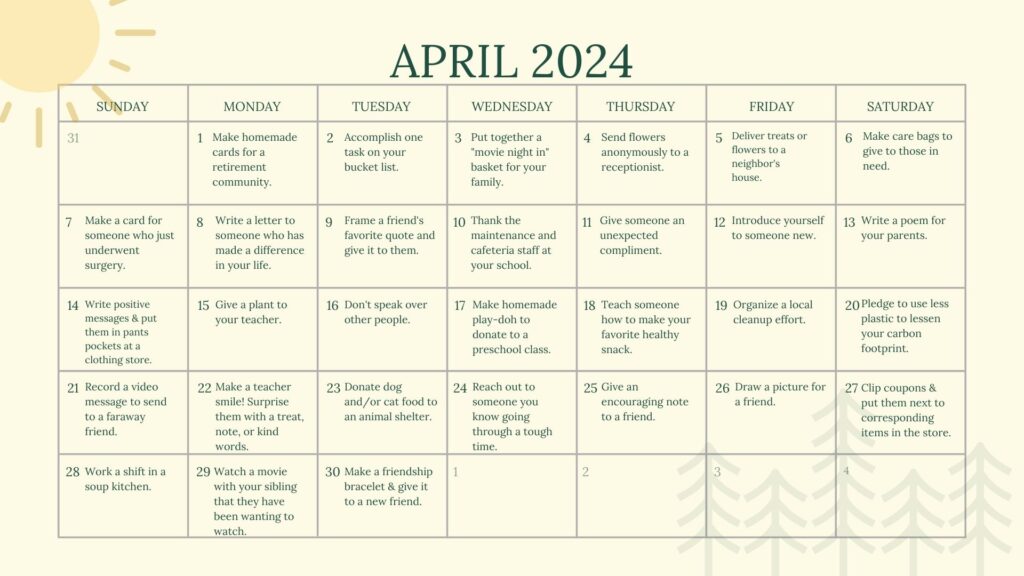
April Parent Coffee
“Why Campers Can be Homesick AND Happy”
Are you worried that your child will struggle adjusting to being away from you and away from home at camp this summer? Come discuss the discomfort some children experience being away from home and parents and how you can help your camper not only work through separation anxiety but end up confident and happy about future away-from-home adventures (like college).

March Kindness Calendar
Hello everyone! It’s a new month so that means new opportunities to show kindness to those around us! Click here to download the printable version.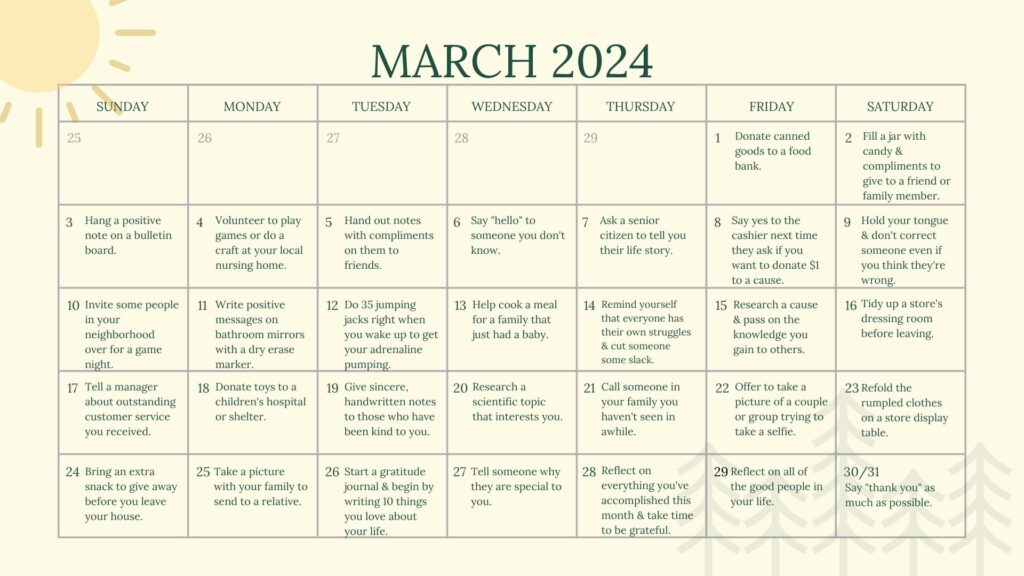
Building Empathy – Our 2024 Summer Theme!
Building Empathy is our 2024 Summer Theme!
Empathy is our ability to understand how others feel, and building our empathy skills are foundational for closer friendships and improved well-being. In a world that is increasingly divided, building empathy is vital to cultivating meaningful relationships with people from diverse backgrounds.
Empathy is a skill that can be practiced, and this summer, we will focus on six tools to help campers cultivate empathy:
- Active Listening
- Emotional Literacy
- Perspective-Taking
- Storytelling
- Disagreeing without Debating
- Being an Upstander
Our logo this year includes a blueprint drawing and construction tools. A blueprint drawing is one of the first phases in planning and design during a construction project. Just as architects must consider various perspectives when designing a building to meet the needs of different users, developing empathy requires understanding and appreciating the perspectives of others. A blueprint also provides a comprehensive plan for a building, considering not just its individual components but how they interact to create a functional and harmonious space. Empathy requires seeing the whole picture by considering the emotions, experiences, and circumstances that shape others’ perspectives and behaviors.
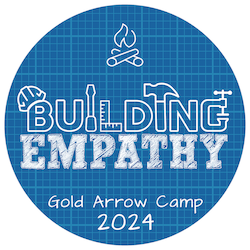
Just as construction tools are used to measure, cut, and shape materials, empathy involves using various “tools” such as active listening, perspective-taking, and emotional literacy to understand others’ experiences, perspectives, and emotions.A well-equipped construction toolkit contains a variety of tools for different tasks and situations. Just as construction tools are used to build structures that connect people and communities, empathy serves as a tool for building bridges and connections between individuals, fostering mutual understanding, compassion, and cooperation.
This summer, we will talk about how we can build our empathy each day at Morning Assembly, and we’ll be adding skills to our empathy “toolkits.” At campers’ nightly cabin campfires, counselors will facilitate empathy-related discussions, and help campers practice active listening and storytelling through daily sharing.
Building Empathy is about putting less emphasis on “me” and more emphasis on “we.” Empathy builders connect with others in meaningful ways and seek to better understand how others are feeling. Our goal is for campers and staff to become empathy builders in their schools, workplaces, and communities.
Our theme this summer builds many of our past themes related to gratitude, kindness, kindness (Cool 2B Kind), relationship building (Creating Connections), helpfulness (Give a Hand), grit (Growing Grit), positivity (The Energy Bus), a focus on friendship (Find-a-Friend), building up others (Filling Buckets), being our best selves (Be You), appreciating our community (Better Together), and Choosing Kindness (2022).
We can’t wait to build our empathy skills together this summer!
March Parent Coffee
Building Empathy (GAC’S 2024 Summer Theme)
Empathy is our ability to understand how others feel, and building empathy provides a foundation for friendships and overall well-being. In a world that is increasingly divided, building empathy is vital to cultivating meaningful relationships with people from diverse backgrounds.
Empathy is a skill that can be practiced, and this summer, our theme will focus on building empathy by improving emotional literacy, active listening, perspective-taking and storytelling skills, and learning the importance of disagreeing without debating and being an upstander.
Building Empathy is about putting less emphasis on “me” and more emphasis on “we.” Empathy builders connect with others in meaningful ways and seek to better understand how others are feeling.
We hope you can join us on March 13 for a discussion about:
- What we’ll be doing at camp this summer to help campers build their empathy skills.
- How you can help your kids build empathy habits that last.
We’re going to offer a morning and an evening session to accommodate more parents’ schedules. Join us on March 13 at 10am PT OR 7pm PT.
Here are some optional resources to check out before our chat:
Ep. 138: Unselfie with Dr. Michele Borba | Sunshine Parenting
Empathy is a Verb | Michele Borba | TEDxTraverseCity
UnSelfie: Why Empathetic Kids Succeed in Our All-About-Me World is Dr. Michele Borba’s book about empathy habits we can help kids develop, practice, and live out.
Book description: “Empathy is a trait that can be taught and nurtured. Dr. Borba offers a framework for parenting that yields the results we all want: successful, happy kids who also are kind, moral, courageous, and resilient. UnSelfie is a blueprint for parents and educators who want kids to shift their focus from I, me, and mine…to we, us, and ours.”
Register for one of our March Parent Coffees:
March 13 @ 10am PT Register Here
March 13 @ 7pm PT Register Here
Check out other upcoming parent and camper events here!
